Displaying items by tag: Peter Malone's Movie Reviews
October 8
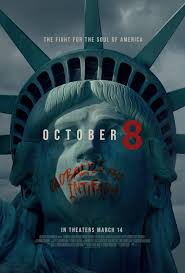
OCTOBER 8
US, 2025, 100 minutes, Colour.
Directed by Wendy Sachs.
The 1983 moviie, The Day After, focused on the aftermath of nuclear war. The title of this film, October 8, is also the day after, the Hamas attack on Israel, the massacre, the hostages.
The timeframe for this documentary is October 7 until October 2024. With the ongoing invasion of Gaza, the continuing role of Hamas in the peace negotiations, the numerous deaths in Gaza, especially women and children, the allowing and then the forbidding of food trucks, international diplomacy…, one of the interviewees actually mentioning this towards the end of the film, there is the challenge to the audience of 2025 and later, to look at the wider perspectives.
However, this film is particularly focused, written and directed by Wendy Sachs, one of the producers being prominent actress, Debra Messing, who introduces the film to the wide American audience and beyond. And the focus is on the consequent anti-Semitism in the United States, especially on prominent university campuses in the aftermath of October 7.
There is a wide range of talking heads for the documentary, especially Jewish students (from a range of ethnic backgrounds), political commentators, political representatives, many impassioned speeches.
As it should, the film highlights the horror of the Hamas attack, many clips included, the numbers killed, their ordinary backgrounds, the hostages taken. And, there are many photos of the hostages as well as some interviews with friends and relatives. During the film, there is no mention of the Israeli government, of the attack on Gaza, no mention of Benjamin Netanyahu and his supporters and his motivations, his political career as well as the eradication of Hamas. These issues will arise in any discussion about this documentary.
But, what is emphasised is the prevalence of anti-Semitism, memories of the establishment of the state of Israel, the treatment of Palestinians, the bases for some anti-Semitism. However, there are frightening sequences of public protests and demonstrations, vicious statements and, especially in these days of social media, brutal and hostile criminal threats.
The film also highlights the response of heads of universities in dealing with the demonstrations on the various campuses, including Cornell, Harvard, Santa Barbara. Some of the presidents of the universities are seen in Senate hearings, the critique being that they did not deal properly with the anti-Semitism and the violence. Some later resigned.
For Jewish audiences, the Zionist audiences, this is an important reminder of the experience of anti-Semitism, especially in the United States, during 2024. It raises images and memories of past anti-Semitism, especially by the Nazis and the Holocaust.
For non-Jewish audiences, it is a challenge, to check bases for opinions, to check how well informed we actually are about Israel, anti-Semitism, the role and fate of the Palestinians since 1948, the various uprisings.
In 2025, after the events shown in this documentary, the world, the United Nations, have had to face the increasing number of deaths, the number of world organisations and some countries accusations of genocide against the Netanyahu government, the images of death, injuries, destroyed buildings, hospitals, Palestinians continually on the move, the long prevention of entry of food trucks into Gaza in early 2025…
And the long delays in returning hostages and the bodies of hostages.
Not last words or images, but words and images that need to be reflected on, discussed with truth, honesty, reconciliation.
Great Lillian Hall, The
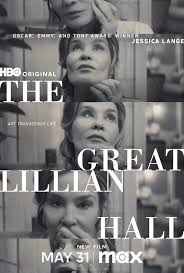
THE GREAT LILLIAN HALL
US, 2025, 110 minutes, Colour.
Jessica Lange, Kathy Bates, Lily Rabe, Jesse Williams, Pierce Brosnan, Michael Rose, Cindy Hogan, Keith Arthur Bolden.
Directed by Michael Christofer.
As we watch the central performance, we are probably thinking “The Great Jessica Lange”. For 40 years she has top lined in quite a range of strong films as well as television programs and has won two Oscars. She is perfect casting here.
The film has been directed by actor and writer, Michael Christoffer, Pulitzer and Tony award winner for his play, The Shadow Box. The screenplay is by Elisabeth Seldes Annacone, inspired by her actress aunt, Marian Seldes, who had the reputation, like Lillian, of never missing a performance.
This is a story of a Grande Dame, First Lady, of the Broadway theatre. In a collage during the opening credits, she is seen on stage in rehearsals for Chekhov’s The Cherry Orchard, intercut with many scenes of her daily life, using the same words, performances. Lillian Hall has been a significant name in Broadway lights for decades. But, a slip and a bump into a fellow-actor during rehearsal indicates some unease.
In fact, the great Lillian Hall is in the early stages of developing dementia. And, we realise, that with these slips, with some dramatic nightmares, with the frequent appearances of her deceased loving husband and her comfortable love for him and need for his presence, she is aware of the situation.
On the personal side, there is her long-time assistant, Edith (a feisty Kathy Bates) who discovers her medication and realises the truth. There is a visit from her daughter (Lily Rabe), reaching out to her mother, but her mother over the decades often emotionally remote from her daughter.
There is a visit to the doctor, clarity of diagnosis, medication, advice. But, as we expect, Lillian Hall is determined that the show must go on, that she will be in command of her memory, reciting her lines, accurate blocking of the performance on stage, communicating with her director. The central character of The Cherry Orchard often like Lillian Hall herself.
She does have some support from her sympathetic neighbour, Pierce Brosnan.
There are many scenes of rehearsal, of slips, of Lillian’s determination, of communication with her serious-minded director who places great hopes in her, hopes that are not shared by the dismal financial prospects for the producer should the show fail.
We may not have liked Lillian Hall very much if we encountered her in real life, nor she liking us. However, the film invites us to share in the dread of dementia, in the upsets that it causes, some hope when she does reach out to her daughter with a visit, and some plain speaking with Edith. But Edith does have one solution, for Lillian to be connected by microphone and Edith to be her prompter – and a sequence in the rehearsal indicating whether this could succeed or fail.
So, ultimately, the dramatic climax is the dress rehearsal, the cast ready, a substitute ready, the anxiety of the director, the impatience of the producer. And Lillian Hall, about to go to the theatre, experiencing another appearance of her husband, remembering his devotion to her, his directing her, his support.
And, even to the final moments, the audience continues to wonder if she will get to the theatre and, if so, could she actually maintain her presence of memory, could she make it through the performance, the eagerly anticipating audience arriving, including her daughter, or, the experience of her condition compelling her to face reality?
Of course, the ending, whether happy or sad, is well worth waiting for.
- Acclaim for Jessica Lange and her performance?
- The New York setting, the Broadway settings, the theatre, apartments, the New York streets, homes, restaurants? The musical score?
- The tradition of Broadway actresses, stars, first ladies? The image, the audiences, over many decades, the range of plays and performances, awards? The public lives, success? Their private lives, character, strengths and weaknesses, marriage, children, relationships, ups and downs? And the issue of ageing?
- The introduction to Lillian Hall, the opening sequences, in real life, encounters with people, the hotel doorman, friends and associates in the theatre, transferring some of those sequences in words to stage performance?
- The Chekov background, The Cherry Orchard, the central character, the screenplay drawing the parallels with Lillian Hall?
- The rehearsal sequences, the members of the cast, their characters, relating to Lillian Hall, the beginning of the difficulties, memory losses, staging and blocking? David, as director, his ambitions, dedicated to theatre, no family, working with Lillian, supporting her, understanding her, visiting her, and the visit to her daughter and family? The discussions with the producer, her hard-headedness, business issues, having the standby? The tensions behind the scenes?
- Lillian, Jessica Lange’s performance and presence, intensity, the thought behind her close-up sequences, inner intensity? Lillian, her age, reputation, her long career, directed by her husband, her devotion to him, his continued reappearance, her bond with him, wanting to be with him, the park, the park bench?
- Her forgetting her lines, her seeing her husband, the disturbances at night? Working with Edith, for 20 years, Edith and her personality, asked by Carson to look after Lillian, the sequences at home, arguments, telling Lillian off? Margaret’s visit, the quiche, the tension between mother and daughter?
- Margaret, her relationship with her mother, her marriage, her artist husband, her son? Visit to her mother, her mother turning up at the home, with David, the meal, the conversation, unable to tell her daughter the truth? The hospital sequence, the doctor telling Margaret the truth, her outburst against her mother, sense of alienation, her mother not disclosing her illness to her? Yet, the memories, her childhood, with the theatre, her parents, Lillian coming home, sitting on the bed, singing the song? And the older Lillian singing the song to her daughter? The finale, at the theatre, her mother acknowledging her daughter in the audience?
- The visit to the doctor, his talking the truth, the test, the memory, folding the paper and the hand trembling? The pills? The prospects, the symptoms, the decline, her having to expect dementia?
- Ty as her neighbour, the conversations, support and advice? His character, friendship, relationships?
- Edith, discovering the tablets, confronting Lillian, Edith frantic when Lillian visited Margaret? The plan, the earpiece for the prompting? The rehearsal? Lillian not turning up for the premiere, Edith frantic again, meeting her at the park bench, the argument, Lillian drawing on her energies, going to the theatre, the performance, Edith with the prompting, the audience, acclamation, the performance, wandering, yet the final achievement, the curtain call?
- The happy ending, Lillian and a final achievement, reconciliation with her daughter, with Edith, the success for the director and the producer?
- The film and the themes of dementia, in public figures, diagnosis, prognosis, acceptance and not, decisions how to behave, to relate? The need for letting go?
Ordinary Happiness/ Momenti di Trascurabile Felicita
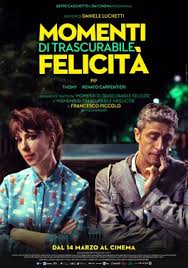
ORDINARY HAPPINESS/ MOMENTI DI TRASCURABILE FELICITA
Italy, 2019, 93 minutes, Colour.
Pif, Thony, Renato Carpentieri.
Directed by Daniele Lucchetti.
A lightheartedly serious look at the realities of life and death, very much Italian style. One can imagine the same story filmed in France with more personalised intensity, or from Scandinavia rather more cold and serious.
The film is a star vehicle for Italian writer and director who goes by the name of Pif.
The film establishes the central character, Paolo, living in Sicily, married with children. He is rather carefree in style and manner, confiding his life to the audience. Riding his bike, he has a trick of going through lights just as they are changing to red. However, here he experiences a crash and dies.
This is something of a Stairway to Heaven, but very much comic style, crowds and crowds of people waiting to get into heaven, busy clerks at desks. When Paolo is finally called, it emerges that there has been a mistake and he has to go back to earth for about an hour and a half or so. And he is accompanied by the benign old official who will keep an eye on Paolo as he revisits his family.
The rest of the film will depend on one’s suspension of disbelief, as well as one’s sense of humour. And would also depend on response to Paolo as he revisits his life. There is the hour and a half or so that he is allowed to live, going back to talk with his wife, making contact again with his teenage daughter and her offhandedness with him, some scenes with his young son.
However, there is a lot of revisiting his past, many scenes of his encounter with his wife, Afata, the initial meeting and courtship, the years passing, the family. And, there is the question of fidelity, and quite a collage of Paolo and his encounters with a range of women in his life. (Later, the official will remind Agara of one of her infidelity episodes.)
At one stage, the screenplay seems exceedingly macho, comments on the women from the male gaze, touch of the ogling, and a seeming blaming of women if they are attractive and the potential for trapping men.
However, as the film proceeds, there is a lot more focus on Paolo and his reliving the past with his family, explaining the situation to Agata about his death, a good sequence of bonding with his daughter, but also his going to clubs with his friends to watch soccer matches – and the official, knowing conclusions, advising the friends on making a bet.
The moment finally comes, the official gives up on Paolo and he is allowed to stay on earth and goes back to wife and family.
As mentioned, serious in its look at people reevaluating their lives – but, with Italian lightheartedness.
Phoenician Scheme, The
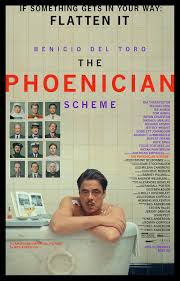
THE PHOENICIAN SCHEME
US, 2025, 101 minutes, Colour.
Benicio del Toro, Mia Threapleton, Michael Cera, Riz Ahmed, Tom Hanks, Bryan Cranston, Mathieu Amalric, Richard Ayoade, Jeffrey Wright, Scarlett Johansson, Benedict Cumberbatch, Rupert Friend, Hope Davis, Bill Murray, Charlotte Gainsbourg, Willem Dafoe, F. Murray Abraham, Stephen Park, Alex Jennings, Donald Sumpter, Scott Shepherd.
Directed by Wes Anderson.
A significant part of the review for The Phoenician Scheme is to look at the huge credits list, many of the cast having appeared in a number of Wes Anderson films. And, of course, expectations from writer-director, Wes Anderson. Anderson has been writing and directing films, including two animation films, for more than a quarter of a century. His tyle and his exploration of themes is, to say the least, highly distinctive.
And, The Phoenician Scheme, is quite idiosyncratically distinctive. It is very stylised in the visuals, the traditional box screen frame, the framing of action, the references to paintings and the staging looking like 20th century paintings. Then there are the performances, also stylised, often life theatre performances, eccentric and clipped delivery of lines, postures and posing. And, for those audiences ready to surrender to Anderson, there are many who do, these visuals and the performances are readily engaging.
There is a plot. The setting is 1950, an entrepreneurial businessman from Hungary, Korda, played perfectly, both seriously and ironically, by Benicio del Toro. He has survived several plane crashes, assassins out to get him and sabotage his plan for development, rails and tunnels in Phoenicia. We are presented with a chart indicating his plans as well as the contacts he must make to improve a shortfall in income project. They serve as chapters for the film.
Korda has many children, his own and adopted, hoping for an Einstein for the future. But his only daughter, Liesl, a novice nun, played by Mia Threapleton, is seconded, initially unwillingly and firmly committed to her vocation, to be his heir. (Mia Threapleton is following in the footsteps of her mother, Kate Winslet, a very interesting role.) And, there is Kord’a new assistant, expert on insects, played with accent by Michael Cera.
Interspersed throughout it is round table conference of elders who are monitoring Korda’s behaviour judging him and his morality accordingly.
The encounters with the various characters for financial help are highly entertaining, eccentric and satirically humorous in their way, incorporating the various stars listed above until a culmination in the fearsome presence of Benedict Cumberbatch Korda’s brother.
Then there are Korda’s memories and dreams, flashbacks in black-and-white, some of his near death, or momentary post-death, experiences, some ecclesiastical in an Orthodox style, others with biblical overtones, again with a number of stars – and a cameo by Bill Murray, who has been working with Anderson for a long time, culminating in his presence as God.
Anderson has a wry and offbeat sense of humour, so often the unexpected, some realism and then some surrealism, farcical moments, deadly serious moments, tantalising the audience, a treat for those who are willing to be tantalised.
- A Wes Anderson film, style, visual, verbal, humorous, satirical, ironic? Underlying serious themes? The strengths of his casts, many actors reappearing in his films?
- The visual style of the film, but colour like 20th century contemporary paintings? Sets and decor? Photography, the black and white flashbacks? Staging of the action, like stage performance, all postures and posings? The stylised action sequences? The performances, stylised and realism? The language of the screenplay, the particular style of delivery? The overall effect and response?
- The setting in 1950, memories of World War II, business enterprises after the war, international entrepreneurs, international projects and finance?, Double dealing?
- The explanation of Korda, his business acumen, the 5%? The background of his marriages? Children and adopted children, hoping for an Einstein? His relationship with his daughter, novice nun, seconding her, naming her as his heir? His staff, his planes, the plans to kill him, his surviving the various crashes?
- The plane ride, his assistant cut in half and swept away, the crash, surviving? Meeting his daughter, her personality, severe, dedicated to the convent, contact with the mother superior, wanting to make her vows? Her not knowing her father, his reputation with her? Her unwillingness to be part of his empire? The plan, her observing his behaviour, learning more about him, her beads, images, sign of the cross, holy water?
- Bjorn, Scandinavian background, accent, present on the plane, his role as assistant, his expertise on insects, his attraction to Liesl, declarations? The comic style of his character, interactions?
- The Phoenician scheme itself, tunnels and railway, the finance, the image on the screen with the various contacts for making up the gap in finance? The structure of the film, the various contacts?
- The background of the assembly, the business discussions, the following of Korda, the decisions about his business and morality?
- The Americans, in the tunnel, on the train, the discussions, suspicions, the meeting with the Prince of Phoenicia, the attack by the camel riders, the Prince saving Korda? The financial discussions, the proposal of the basketball competition, the Prince and his ignorance of the game, Korda hopeless, the skill of the two Americans, yet the Prince succeeding? Getting a grant?
- Going to Marseille Bob, the manager of the club, past relationship with Korda, Liesel and Bjorn observing, the raid on the club, the freedom fighters, the personality of Sergio, Bob upset about the roof, and Korda taking the bullet for Bob? Getting the grant?
- Marty, fast talking American, suspicious of Korda, Korda shot, Marty providing the blood transfusion, making an agreement?
- Going to see Hilda, the distant cousin, her financial knowledge, the prospect of the marriage, her place in the family, with Liese?
- The flight, going to see Nubar, the crash, the jungle, Bjorn and his being unmasked as an agent, his siding with Korda, Korda in the quicksand, Bjorn rescuing him, the arrival of Sergio and his revolutionaries, taking the group to safety?
- The encounter with Nubar, looking sinister, the relationship, the mastermind behind the assassination attempts, discussing the family, the finance, the satirical physical fight between Nubar and Korda?
- Korda, death experiences, near death, his life before him, black-and-white photography, the bearded Orthodox-like sequences, the characters, judgements? The biblical sequences, the personalities, the pageantry, Bill Murray as God?
- Liesl, the contact with the mother superior, her being present for the business deals, the money for the community? Liesl opting to leave the convent?
- The finale, Korda and his being honest, losing everything, restaurant, the working in the kitchen, father and daughter, reconciled, and a happy life?
- The Phoenician Scheme movie
- Wes Anderson
- Peter Malone's Movie Reviews
- Benicio del Toro
- Mia Threappleton
- Michael Cera
- Riz Ahmed
- Tom Hanks
- Brian Cranston
- Jeffrey Wright
- Richard Ayeode
- Benedict Cumberbatch
- Scarlet Johansson
- Charlotte Gainsbourg
- F Murray Abraham
- Willem Dafoe
- Rupert Friend
- Donald Sumpter
- Mathieu Amalric
- Bill Murray
- Hope Davis
- Alex Jennings
Beating Hearts/ Amour Ouf
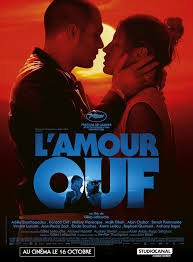
BEATING HEARTS/ L'AMOUR OUF
France, 2024, 166 minutes, Colour.
Adele Exarchopoulos, François Civil, Malik Frikah, Mallory Wanecque, Alain Chabat, Benoit Poelvoorde, Vincent Lacoste, Anthony Bajon, Elodie Bouchez.
Directed by Gilles Lelouche.
Phew Love.
An unexpected beginning to a review. However, Google tells us that this is the English translation for the French title, Amour Ouf. The English title of Beating Hearts sounds more respectable, rather highlighting the nature of the love between a young man who is afflicted with the name, often mocked, of Clotaire, and Jacqueline, always called Jackie, who live in an industrial city in France.
This is a very long film, 2 ¾ hours, immersing the audience in the atmosphere of the town, the neighbourhoods, factories, the port, crowded homes, violence in schools, the 1970s and 1980s.
The first half of the film introduces us to these two central characters, very striking performances from Malik Frikah as Clotaire and Mallory Wanecaue as Jackie. Even at home, when very young, Clotaire imposes himself on everyone around him, his impatient factory working father, his mother, the siblings. Jackie, on the other hand, has lost her mother in a sudden car crash, lives with her earnest father who wants only the best for her. While Clotaire throws his weight around at school, tough with fists, tough with language, he is attracted to the young girl and she to him, some very romantic sequences, dancing, comfortable together, beating hearts.
Music is a very important part of the film, the songs of the period playing throughout the whole film, popular, memories for audiences, significant lyrics.
But, this is also a crime story, Clotaire and his friends, gradually getting caught up in a world of drug dealing, rivalries, gangs, violence, bosses appreciating Clotaire’s carefree and violent talents. Many French writers and directors enjoy making action crime films. Director, Gilles Lelouche, prominent star in French cinema for many decades, has appeared in several of these films and energises the action here in an elaborate heist sequence during the protest by sacked workers at the port, an eruption of violence and Clotaire going to prison.
As something of a balance to Clotaire’s story, there is a focus on the interaction between Jackie and her father, his constant concern for her, the ups and downs of her crises, reacting against his protection but always going back to him for support, love and advice.
The second half of the film has Jackie, not allowed to visit clutter in prison, encountering an up-and-coming businessman, Jeffrey (Vincent Lacoste) fending him off, marrying him, yet, we might say, her heart definitely not beating for him. And then Clotaire gets out of prison. He seems subdued, and for a moment, we hope that his life has changed. But, there is the issue of taking a fall for others and seeds of revenge kindled.
The adult Clotaire and Jackie are played by starts Adele Exarchopoulos and Francois Civil.
So, after such a long time sharing the beating hearts of Clotaire and Jackie, how can it possibly end? As with the words of the French title, Phew Love.
- The tone of the original title, Phew Love, a mad love? The contrast with the serious intensity of the French title?
- The impact of the film as a whole, the long running time, the storytelling over decades? The social context, the romance, crime and punishment? The skill of the director and his experience in acting?
- The end of the 20th century, the final decades? Friends and its issues? The northern town, industrial, the port? The poorer neighbourhoods? Schools? Families? Homes? Deals, criminality? Drugs? Bosses, gangs and rivalries?
- The focus on Clotaire, within the family, his dominance of the of the children, his personality, clashes with his father, the role of his mother? Going up, the team, dominant, extroverted, violent, clashes with students, his range of friends, the going together, the criminal side, the gangs, the encounter with the bosses, doing deals, confronting bosses, the violence, Clotaire’s standing up to them, ingratiating himself, becoming part of the gang, proving himself to the boss and his liking him, the boss’s son?
- The plan for the big heist, the background of the industry, the port, the sacking of the workers, including Clotaire’s father, the consequences? The decision for the robbery during the protest at the port? The group, interactions, the plan, the containers, the trucks, the robbery? The security guards, the gun, the boss’s son shooting the guard dead? Clotaire trying to revive him? The escape? The police? The arrests?
- Clotaire, the implications that he was the murderer, his lawyer, ineffectual, his becoming the victim? 10 years imprisonment?
- The romance story, introduction to Jackie, the death of her mother, her relationship with her father, her studies, competence, intrigued by Clotaire sequences together, the dancing, romance, her highly emotional involvement, ups and downs emotionally, her father, his character, expectations, trying to help his daughter, her variety of moods? Clotaire and his imprisonment? His not allowing her to visit him?
- The 10 years passing, the effect on Clotaire, seemingly calm, out of prison, with his family again, the support of his mother, relationship with his brother? Finding his black friend again? And his friend being killed? His looking for Jackie, the visit to her father, the father protecting his daughter? The possibilities for clarity, a different life?
- The seeds of revenge, going to see the boss, his age, decline, explanations of his shielding his son, letting Clotaire take all the blame? The visit of the son, his prosperity, arrogance, drug deals, the club? Clotaire and his friends, the confrontation with the son, shootout?
- Jackie’s story, not seeing Clotaire for 10 years, Jeffery, her work, slack, her offhanded manner with him, his response, proposal, the marriage? The tensions within the marriage, her pining for Clotaire, his travels, suspicions, confronting her?
- The impact of the opening sequence, the older Clotaire, his gang, the raid, the confrontations, the shootout? This sequence occurring again, but with a different ending, Clotaire’s moving away?
- Jackie, the phone, the confrontation with Geoffrey, Clotaire and Jeffrey, Jackie and her love?
- The future, Clotaire and his vengeance of violence,, the relationship and Jackie?
Frightened City, The
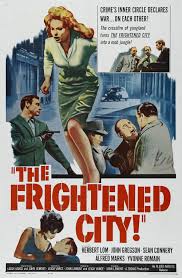
THE FRIGHTENED CITY
UK, 1961, 97 minutes, Black-and-white.
Herbert Lom, Sean Connery, John Gregson, Alfred Marks, Yvonne Romain.
Directed by John Lemont.
The Frightened City is in the early 1960s, a shift in some British films to black-and-white, crime features, corruption, especially in London, films like Expresso Bongo.
The screenplay takes protection rackets in London very seriously, references to Chicago mobs but this time a focus on the police, their pessimism about what was happening to the city, their work, and the presentation of the criminals but in no way glamourising them.
Herbert Lom plays a suave accountant, an influencer and mastermind. John Gregson plays the very serious-minded police inspector. Alfred Marks is a confident criminal, not presented as likeable in any way. Yvonne Romain is a singer.
But, the main interest is in Sean Connery, who had been in films and television for many years but was emerging as a more prominent actor, this film appearing the year before his first James Bond film, Dr No.
- A thriller of its time. Black-and-white, city crime, police, protection rackets? Comparisons with American films, reference to Chicago?
- The situation in London, 1960s, criminals, protection rackets, thugs causing havoc in shops and restaurants, proprietors paying protection? The role of the police, confronting criminals, the arrests?
- Inspector Sayers, his team, serious minded, desperate about the situation in London? Interrogations, confrontations, confessions, persuasion? The other members of the team?
- Waldo, accountant, money matters, schemes, his connections, suave manner, treatment of his secretary, his promotion of Anya, going to the club, her job? His connections, Harry, the protection racket, the interview with Paddy, the transition to injection for big companies, building sites…?
- Harry, criminal activities, the range of thugs, some old-fashioned, codes, the scenes of upset in restaurants, the owners, the havoc, paying protection? Not informing the police?
- Anya, documentation, singing, Waldo and the relationship, the nightclubs, singers, dancers, rehearsals, her success? The encounter with Paddy, the relationship?
- Paddy, a Sean Connery character, petty thief, his partner and his injuries, approached by Harry, interviewed by Waldo, his phone calls, persuasion, at the restaurant, the fake fight, getting protection money? His advice for the protection money from companies, the interviews, suave manner? Seeing Anya, his friendship with Sadie, the relationship, his being used for the killing of the old-time criminal, his reaction, his former partner supporting him to tell the truth, with Inspector Sayers, the pressure, his setting up Waldo, setting up Harry, the final fight, deaths, arrests? The influence of Sadie?
- The protection rackets of the past, the American models, continuous protection in later decades, bikie gangs, corrupt union officials …?
- The dialogue from Inspector Sayers and the very serious minded perspective on crime and criminals rather than sensationalist action films?
Rewriting Trump
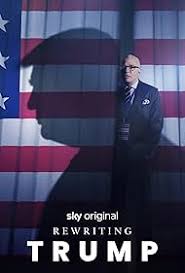
REWRITING TRUMP
US, 2025, 97 minutes, Colour.
Michael Wolff.
Directed by Arthur Cary, Yasmine Permaul.
A Trump-focused documentary released soon after the inauguration of Donald Trump in 2025. There have been a number of documentaries about Trump himself as well as analyses of his followers, especially three films by director, Don Partland. Unfit: The Psychology of Donald Trump, God & Country, #UNTRUTH: The Psychology of Trumpism. In comparison, this film is slighter though always interesting.
The focus of attention is on writer, Michael Wolff, author of three books on Trump, a writer rather than a political analyst, interviews with Trump, observing him closely, his observing those heading his 2024 presidential campaign. To that extent, the film is very interesting in looking at Trump at the beginning of 2024, his campaign manager and advisers (not a flattering treatment of them), various stages in 2024, Trump’s candidature, the debate with Biden and the fiasco for Biden, the managers hoping for competition with Biden, the emergence of Karmela Harris, the debate with her, Trump’s extraordinary odd performance and her emerging more successfully, the rally at Butler, Pennsylvania, the assassination attempt and Trump rising up and raising his fist and calling “Fight, fight, fight”.
There is also a focus on the Stormy Daniels trial, very interesting for the interviews with her and her commentary, and her attitudes towards Trump. Then there is the verdict, 34 charges and Trump guilty. But, outside the courts, the continued support for Trump and the ignoring of the reality of the charges. The huge following the developed during his first candidature and was dramatised by the rights on January 6, 2021.
There is also the Republican convention and Trump’s nomination as the presidential candidate.
The film touches on election night, the anticipation of the tight race, an overwhelming victory for Trump, and a critique of the ordinariness of his acceptance speech, and his continued repetition of his MAGA themes.
However, this film would be much more interesting had writer, Michael Wolff himself, been a more interesting presence on screen. He is not very interesting at all, photographed a great deal, at home, with wife and children, mooching around at conventions, cursirily speaking to admirers, but generally aloof, sometimes very tangled and hesitant in his comments to camera, making some observations, reference to his encounters with Trump.
However, his themes are in the title, a critical look at Trump himself, Trump’s self-absorption, his repetitions, his going off track, his mean-mindedness, especially, for example, against his competitor, Nikki Haley.
At the end, the sometimes lugubrious Michael Wolff writes his book on Trump, his third, then at the end of the film a number of passages of Trump, in full flight, invoking fake news, condemning writers, spurning Wolff.
So, the state of the question about Trump and his presidency at the beginning of 2025.
Bring Her Back
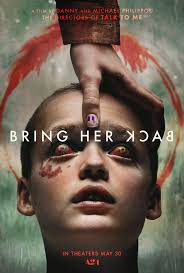
BRING HER BACK
Australia, 2025, 104 minutes, Colour.
Sally Hawkins, Billy Barratt, Sora Wong, Jonah Wren Phillips, Sally-Anne Upton.
Directed by Danny Philipou, Michael Philipou.
A second feature film from twins, Danny Philippou and Michael Philippou. Prominent on social media, there were very successful with their first film, Talk to Me, small-budget teen horror, filmed in Adelaide, and earning several times its costs with its US release. Well reviewed, taking its place in prominent horror films, with supernatural touches, of the 2020s.
Which means a great deal of anticipation for Bring Her Back. While it can be described as a horror film, it is perhaps better to refer to it as a drama about family with some horror touches (a couple of which will make the audience very uncomfortable). It is not about supernatural influences but rather the consequences of grief and mental disturbance.
The brothers are from Adelaide and, once again, have filmed there, mainly in two homes and in the social welfare office. But, the main home as a bush setting, attractive, and making the action seem more sinister.
The casting is very good indeed. British actress, Sally Hawkins, has been impressive for more than 20 years in a wide range of roles, both serious and comic. Billy Barratt is a young British actor, before the age of 20, has built up quite a reputation and won an Emmy. On the other hand, Sora Warm, legally blind, appears convincingly in her first film. The surprise of the cast is 10-year-old Jonah Wren Phillips in an extraordinary demanding role as a tortured boy. In fact, the cast performs admirably.
The film opens with a sad and credible situation, a father suddenly dying at home, bonds between his two children, especially Andy looking after his blind sister, Piper. They want to stay together, and he almost 18 is happy to be Piper’s guardian. But, in the meantime, they are assigned to stay with Laura, Sally Hawkins, grieving after the death of her daughter. And they find that she has a young boy, Oliver, also in the house.
For a review, that is probably enough for setting the scene. Andrew’s and Piper’s arrival and Laura’s welcoming, an exuberant fussing which audiences might feel she is certainly overdoing, is happy enough. But, the directors have disturbed the audience by showing some mysterious sequences, videos of some kind of violent rituals, seen again during the film, but never really explained. It means that the audience is being kept on edge – not that that is really necessary as the film progresses, the funeral of the father, a strange aftermath of drinking and playing games, and the problem of Oliver who remains mute, mysterious.
As an exploration of deaths and consequent grief, of family bonds and loving commitment, Bring Her Back is very effective. (And the title refers to Laura’s dead daughter.) But, the screenplay is full of unexpected turns and twists, the testing of Andy’s character, strong and committed, Piper and her eager response, encouraged by Laura, some frightening explanations about Oliver, and, the heightened melodrama of the final confrontations.
Bring Her Back works very well as a family and relationships drama – with a warning of the MA certificate for some alarming violent moments.
- The reputation of the directors? Horror traditions? Australian-based, an Australian production? British actors?
- The title, Laura and her daughter, her daughter’s death, the effect on Laura and her mind, the keeping of her daughter’s body? Her interest in Piper, a substitute daughter?
- The South Australian settings, homes, the streets, school girls, the social service office, the countryside, Laura’s home, the bush, the outside shed, the interiors and atmosphere, the rooms, the decor? The atmospheric score?
- The video sequences, the rituals, hard to see clearly? The purpose of inserting the video during the film, an alert, Laura watching them over and over?
- Piper, her blindness, on the street, the bus, Andy picking her up, the mockery of the girls? Andy and protection of her feelings, saying pleasant things rather than the truth? At home, the bond, half brother and sister? The shower, finding their father dead? Andy later being haunted by the image of his dead father? And the revelation about his brutality towards his son?
- The situation, Wendy at the office, Andy wanting guardianship of Piper, three months before turning 18? The discussions, and her taking them in?
- Sally Hawkins performance as Laura, eccentric, but learning that she had been a counsellor for 20 years, trying counselling sessions with Andy, the intensity of her welcome, audiences uneasy with her? Andy uneasy, Piper accepting her? The house, the rooms? The appearance of Oliver, age, undressed, mute, the bruises on his face, Laura’s explanations? The atmosphere?
- The funeral, Andy not wanting to look at his dead father, the memories, Laura taking some of the father’s hair? Superstitions, her saying that the spirits of the dead sometimes remain four months after death? The sense of his father’s presence? Andy at the images?
- The aftermath of the funeral, the drinking, the playing games, raucous? Children more at ease?
- Andy, wary of Laura, the urine, her pouring it on Andy, waking, upset, washing his clothes? Laura and her treatment of Andy, alienating him? The contrast with her behaviour with Piper, taking her out, Piper and her exuberance, the hall and the playing games?
- The importance of Piper, her appearance, her eyes, legally blind, her devotion to Andy, the bond with Laura, her final strength?
- Oliver, abducted, his being starved, emaciated, treatment of him, locking him in, in the swimming pool, the swimming pool and her daughter’s death, the writing on the pool, the rain and the pool filling, Oliver and his being starved? Andy finding him, offering him food, Oliver and the knife, putting it in his mouth, breaking his teeth? In the shed, the bodies?
- Andy, suspicions, driving to see Wendy, the explanations, her disbelief, his seeing the poster about the abducted boy? Persuading Wendy, going to the house, Wendy examining the house, Laura pretending to shower, persuasive? Andy, going to the shed, the body, Oliver and his appearance, Wendy going to the car, Laura crashing into her?
- The confrontation with Andy, the fight, in the pool, the memories of her daughter’s death, Laura holding Andy’s face under the water, his death?
- Laura, mad, with Piper, Andy and his phone call, recorded, the issues with the phone throughout the film, Piper, taking her stand, against Laura, the fight, Laura’s death?
- Piper, surviving, the future?
Fear Street: Prom Queen
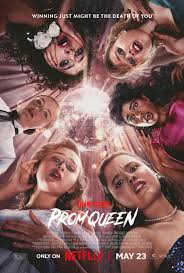
FEAR STREET: PROM QUEEN
US, 2025, 90 minutes, Colour.
India Fowler, Suzanna Son, Fina Strazzi, Katherine Waterston, Lily Taylor, Chris Klein, Ariana Greenblatt, David Iacono, Darren Baker, Ella Rubin.
Directed by Matt Palmer.
A further instalment in the Fear Street franchise, based on the many Young Adult novels by prolific author R.L.Stein (even more Goosebumps novels). It follows three Fear Street features which range from the 17th century to the 20th century.
This is a very straightforward film. The focus is on a school, having something of a disreputable reputation but aiming higher. It is final year and the preparation for the 1988 Prom, six students vying to become Prom Queen. It highlights each of the characters, their friends, especially boyfriends, the principal of the school who is dominated by the vice principal played by Lily Taylor.
There are class sequences, some mocking of the teacher, and even further mocking of one of the students, Lori Granger, played by India Fowler. She is at the centre of the film. She has been the object of ridicule because of the death of her father and the explanation of his being murdered by her mother who was found not guilty. Gossip and shame remain.
Lori has a good friend, fond of horror, does some recreational drugs, some mocking touches, especially towards the click vying for prom Queen.
Audience sympathy is for Lori, the sympathetic character, tensions with her mother, but her wanting to become Prom Queen to make some amends, even vengeance, for her mother who lost Prom Queen because of the death of Lori’s father.
As expected, there is a dominating character, very much pushed on by her mother and father, with the jock boyfriend – but whose eyes often roam towards Lori, some pleasant gestures towards her, especially in the diner where she works.
One of the contestants is murdered by a masked and hooded character. Then, on the night of the prom, a whole lot of background of the film given to the choosing of dresses for the prom, the star, Tiffany, helping her girlfriend whom she dominates, Melissa, and mocking and threatening Lori. Four of the girls before a Stars & Stripes dance number, edging Lori off the stage.
Then, four others of the girls and their boyfriends are killed in grim and gruesome manner, some gory touches for horror fans.
Ultimately, there is a threat to Lori and her best friend, pursuits, the masked character entering into the hall after Lori is named and crowned Prom Queen. The character attacks, threatening Lori’s friend, Lori attacking him in the face with her crown.
For this reviewer, the masked character was not on the list of suspects! Police arrive, complications, Lori escorting her rival, Tiffany, home to keep guard for her.
Then, some more, perhaps unexpected, mayhem, explanations of the murder of Lori’s father, some more gruesome killings – and a Young Adult version of Stine’s story, very much geared towards teenagers, especially girls identifying with the characters, and comparisons being made by Prom Night aficionados for the film of that name.
Storm Foretold
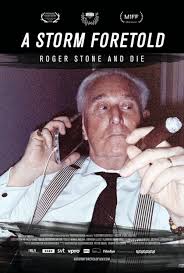
A STORM FORETOLD
Denmark, 2023, 101 minutes, Colour.
Roger Stone.
Directed by Christoffer Guldbrandsen.
A documentary about notorious presidential adviser, wheeler-dealer, political trickster, campaigner, fixer, Roger Stone. Already, in the first year of the first Trump administration, a documentary about Roger Stone was released, Get Me Roger Stone, a look at his career in previous decades, interactions with Nixon, Reagan, the two Bush presidents, and his connections with Donald Trump.
This present documentary, by Danish director, Chrisoffer Guldbransen, began filming in the late 2010s, the Danish documentary maker interested in the 2016 political campaign for Donald Trump, his advisers and tacticians, his victory and the subsequent years. He decided that a way into understanding these years of American politics was to get to meet, know, understand, film Roger Stone.
This is a frightening documentary, especially in the expose of Roger Stone himself and his willing participation in this documentary, many many warts… It is especially frightening in retrospect, the portrait Stone himself, his wheeler dealings on behalf of Donald Trump, a long litany of dirty tricks, his arraignment for his participation in the Russian influence in the Trump election, going to court, his presumption that he would not be found guilty, the extraordinary support he had from right-wing groups, especially the Proud Boys, many of whom were his security guard. And there was the support of extremist radio personality, Alex Jones.
He was found guilty, an appeal to Trump, his sentence commuted, eventually pardoned.
There is a kind of intermission in the middle of the film, Stone breaking with the director, the director dependent on Danish funds for continuing his film, Stone ridiculing Danish socialism, the director seen going to a gym, excerpts from the surveillance camera, his cardiac arrest and treatment, survival. Then, some sympathy from Stone, and the director’s returning and continuing the film, especially for 2020, Covid, the campaign, and a special focus in anticipation of the loss by Trump, the “Steal the Vote” campaign, the rallies, the media commitment by Stone, the talk about violence, and, the tactic of accusing the Democrats of the kind of behaviour that they would do in revolt had they lost, the very tactics by the Trump supporters and the denial of the loss of the election.
Some graphic excerpts from the January 6, 2021 riots, Stone watching on television and deciding to get out of town to Florida that day.
Stone is certainly a very vulgar man in all ways, supremely confident, seen with his wife, with the various guards, meeting supporters, getting all kind of flattery and affirmation, and always the showman. However, the film ends with Stone and some disillusionment with Trump after January 6, even calling for his impeachment, very strongly.
Perhaps because he is the showman and so confident, he agreed to the making of the film, allowing all kinds of remarks, commenting on the director, often being very frank in his opinions and almost always offensive.
The film was released at the beginning of 2024, at the beginning of the Trump campaign for re-election. Roger Stone was invited to be present at Trump’s second inauguration. But, in the light of Trump’s second term and behaviour, the film becomes even more frightening, not just a look back at the past, but some fears for the future.
American director, Don Partland, made three very significant documentaries about Donald Trump and Donald Trump’s followers: unfit: and the Psychology of Donald Trump, released in 2020 during the first campaign; God & Country, about the religious right and in support of Donald Trump, 2023); # TRUTH: The Psychology of Trump is in, 2024. A Storm Foretold is a significant documentary accompaniment to these three films on Trump and Trumpism.